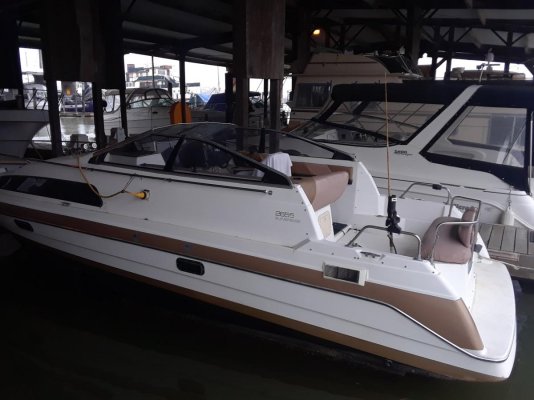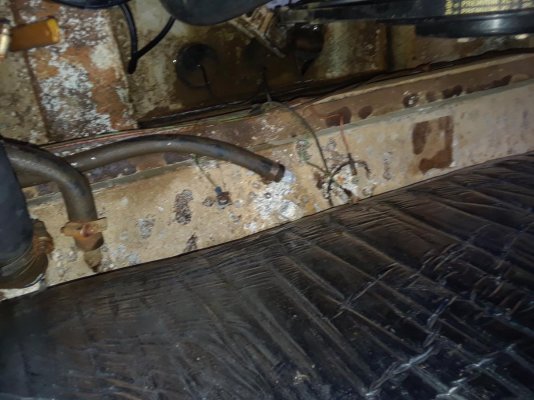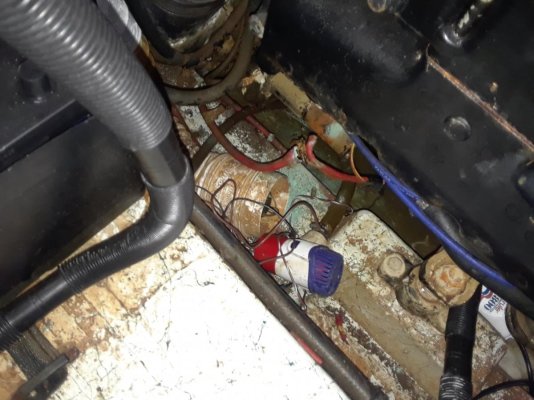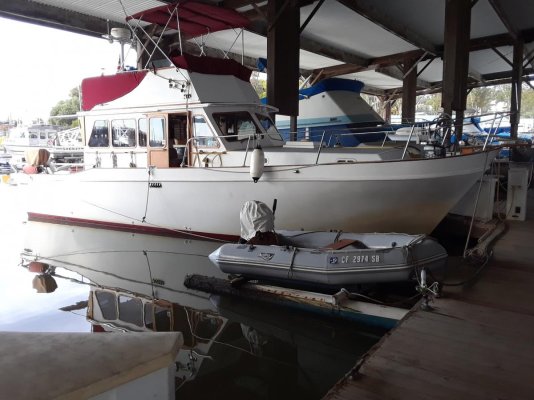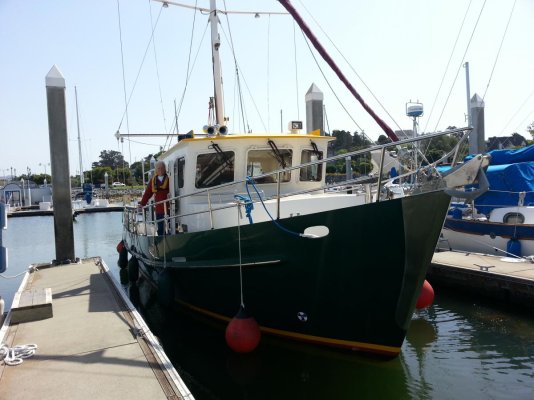- Joined
- Apr 15, 2008
- Messages
- 13,731
- Location
- California Delta
- Vessel Name
- FlyWright
- Vessel Make
- 1977 Marshall Californian 34 LRC
Last week I got a call from the newbie owner of the gas powered 1991 Bayliner 2655 sharing my double slip. The boat had been sitting unused for over a year and he wanted to sell the boat to free himself of the monthly expenses. The boat has had a leaking bellows that caused the boat to take on water requiring a pumpout by the marina personnel a couple of months ago. I mentioned to him that a friend, Sean, had just blown the engine in his 24' Sea Ray and might be interested. (Sean used to own his own boat repair company before starting his own business copier company.) But we'd have to look it over closely due to the water in the engine compartment.
Sean and I scheduled a time to look the boat over. Inside was clean and no smell, in pretty good shape except for the worn carpet. When we opened the engine hatch, we could see where the water had come up half-way up the 5.7l Mercruiser engine. The oil looked OK, but we did not start the engine. A socket wrench on the flywheel allowed the engine to rotate but corrosion had already taken place in some of the lower components. That's when we found the danger!
The fuel tank outlet check valve was corroded and crushed at the top aft edge of the gasoline tank, exposing an open line to the fuel tank. On the stbd side of the engine well, the hot start cable was corroded, had fallen off and was lying in the bilge! So we had both a source for gasoline vapors and a spark source within a couple feet of each other!
We immediately called the owner a received his permission to safeguard the safety problems by inserting a taped screw into the fuel tank opening to seal the tank and disconnecting the + cables from the batteries to eliminate the spark risk. We then began negotiations to get this boat out of the water ASAP.
Fortunately, it worked out that the owner was only too happy to give the boat to Sean in return for his assistance in removing it from the water. This week we plan to haul the boat and pressure wash the bottom before dropping it on Sean's trailer. He'll take it home for repair and sale.
The owner has agreed to keep the slip and insurance in effect until the boat is hauled. He also agreed to give me his dingy lift that I was planning to buy from him before all this was discovered.
We're fortunate that we were able to avoid a catastrophe and meet the needs of 3 parties without the transfer of $$. Hopefully Sean will be able to turn a bit of profit on the boat when the repairs are completed.
Below are pics of the 2655, the disconnected fuel line and red cable and the dink lift I've inherited.
All's well that ends well.
Sean and I scheduled a time to look the boat over. Inside was clean and no smell, in pretty good shape except for the worn carpet. When we opened the engine hatch, we could see where the water had come up half-way up the 5.7l Mercruiser engine. The oil looked OK, but we did not start the engine. A socket wrench on the flywheel allowed the engine to rotate but corrosion had already taken place in some of the lower components. That's when we found the danger!
The fuel tank outlet check valve was corroded and crushed at the top aft edge of the gasoline tank, exposing an open line to the fuel tank. On the stbd side of the engine well, the hot start cable was corroded, had fallen off and was lying in the bilge! So we had both a source for gasoline vapors and a spark source within a couple feet of each other!
We immediately called the owner a received his permission to safeguard the safety problems by inserting a taped screw into the fuel tank opening to seal the tank and disconnecting the + cables from the batteries to eliminate the spark risk. We then began negotiations to get this boat out of the water ASAP.
Fortunately, it worked out that the owner was only too happy to give the boat to Sean in return for his assistance in removing it from the water. This week we plan to haul the boat and pressure wash the bottom before dropping it on Sean's trailer. He'll take it home for repair and sale.
The owner has agreed to keep the slip and insurance in effect until the boat is hauled. He also agreed to give me his dingy lift that I was planning to buy from him before all this was discovered.
We're fortunate that we were able to avoid a catastrophe and meet the needs of 3 parties without the transfer of $$. Hopefully Sean will be able to turn a bit of profit on the boat when the repairs are completed.
Below are pics of the 2655, the disconnected fuel line and red cable and the dink lift I've inherited.
All's well that ends well.

